#Writing Lesson
Explore tagged Tumblr posts
Text
Writing Question #2
In a horror story revolving around a twisted romance/love, how would you use or apply different story-writing techniques to create different effects in your story? (Symbolism, foreshadowing, repetition, imagery, voice, etc.)
SCAREUARY 2025 - TWISTED HEARTS
#writeblr#writing#writing challenge#writers#writers on tumblr#writing question#discussion#writing tips#writing lesson#writing advice
14 notes
·
View notes
Text
Sonic Heroes: A Lesson in Romance Dominating Characterization
So, I recently completed the story of Sonic Heroes. And I had a good time, some parts were hard, others easy, but overall, a good time. Though, there was one thing in particular I can’t help but get annoyed about. It’s how they handled Amy’s character.
I can sum up pretty easily what the problem is.

When I see that image, you know what comes to mind for me? What comes to mind is that the two mobians with Amy have lost their beloved pets, and Amy is currently facing down Suspect #1 to bully him into marriage. I don’t see a cute or funny moment; I see Amy putting herself above her friends.
The problem is about personal matters dominating some greater good. It would be like if a superhero made a point of letting a large group of civilians die, especially if it was to save their romantic partner elsewhere. For anyone that believes that “the needs of the many outweigh the needs of the few,” that kind of choice is morally abhorrent. The hero just ends up looking selfish for choosing something personal over the lives of others.
And honestly, I don’t want to be seeing Amy in that light. I don’t want to be seeing any heroes in that light, or any relationship in that light. Heroism and love should be a demonstration of inner goodness, but when it stops being that, then it turns into, at best, toxicity, or at worst, outright villainy.
And I can see how to fix this. Here’s a lesson on how to avoid letting romance dominate characterization, using Sonic Heroes as an anti-example.
Now, the solution to this is actually pretty easy. If romance is dominating the totality of a character, then the solution is to tone it down, or remove it entirely.
All you have to do is let the character show their other aspects by focusing on anything else. Honestly, it’s the “anything else” that really builds a character best. Characters can have: personal goals, personal problems, platonic relationships, a life outside of their beloved; you can use pretty much anything that can generate drama that isn’t reliant on romance.
And there isn’t a shortage of things for Amy to do in Sonic Heroes.
The first option is to focus on Amy being a team leader. With her wishing to be stronger and more involved in adventures following SA1 and SA2, it’s a chance to show what she’s made of. And with the leadership position, it would give us a chance to see how she forms relationships with her teammates. In the game, they don’t give an explanation on why those three teamed up. Their story could focus on that! The Team Rose campaign could take the path of an origin story, showing the Team becoming heroes!
The second option is to have Team Rose run into Team Dark. With Amy being instrumental to Shadow’s redemption in SA2, and Shadow not remembering anything, this is a prime opportunity for drama! There could be major emotional responses on both sides! Especially if they end up coming to blows! Heck, it would help in adding drama to the “Is Shadow real?” subplot. All they’d need to do is handle Shadow’s response carefully. If left open enough, it could have led to more fuel for fan theories to run on!
One last option is to redefine Amy’s goal. Amy doesn’t have to be avoiding Sonic to demonstrate more to her character. In fact, the story opens an opportunity to best show how she sees Sonic. As far as I could see in the story, Cream and Big seem to genuinely believe that Sonic kidnapped their pets, but what about Amy’s reaction? Throughout the original story, Amy never gives an opinion on if Sonic is the kidnapper or not; she only chases him in the name of her “love,” and that’s actually pretty jarring.
Shouldn’t Amy be having more of a reaction to the accusations against Sonic? It doesn’t even have to necessarily be about her crush, it can be about showing how well she knows him or what she believes about him.
Here’s what I mean. If Amy gets confronted by accusations that Sonic has been committing kidnappings, then how she responds will give her character a goal.
If Amy believes Sonic is innocent, then her formation of Team Rose becomes an effort to keep an eye on the teammates who believe he’s guilty, and try to prove to them that Sonic is innocent by taking charge of the search. It can also complicate the teammate’s relationships if their team is stuck arguing about what they think is true. But it also opens them to develop their friendships as their efforts lead them closer to finding Chocola and Froggy.
On the other hand, if Amy buys into Cream and Big’s accusations, then it recontextualizes Team Rose into an anti-Sonic posse. It also opens an opportunity for Amy to realize how little she knows about Sonic when his innocence is proven. And that can in turn open the opportunity for Amy to seek real opportunities to get to know Sonic better, thus leading to a healthier relationship development.
To sum it all up, romance isn’t the only way to get good drama out of your story. In fact, an overreliance on romance can overshadow any other points that can cause meaningful drama. So, don’t rely on romance to cover your story or your character. Take a moment to look at it critically, and ask yourself, “What else could my character be doing?” and the follow-up question, “Will doing this give us more drama?”
If you’re going to take one thing away from this post, then I’ll encourage you to remember that meaningful characters and meaningful people aren’t limited to their relationships, so don’t place those limits.
8 notes
·
View notes
Text
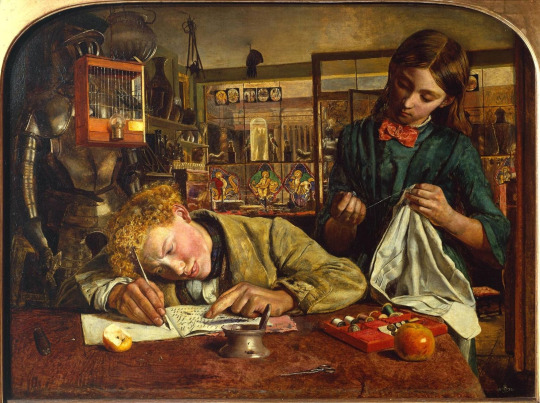
source: bishopsbox
Robert Braithwaite Martineau (British painter, 1826 - 1869), Kit's Writing Lesson, 1852.
Robert Braithwaite Martineau (pintor británico, 1826-1869), La lección de escritura de Kit, 1852.
8 notes
·
View notes
Text
Sometimes you need to sleep, sleep a lot. Not to escape, but to rest your soul from your feelings. Because everything, absolutely everything devours you. Completely.
—Brain
#💭#thoughts 💭#sad thoughts#life lessons#life is fucked#lit#literature#life#poem#poetry#poems on tumblr#poetic#quotes#poets on tumblr#quoteoftheday#life quote#writers and poets#inspiring words#spilled words#spilled writing#spilled poetry#spilled thoughts#spilled ink#reflective writing#writing#mental health#writers on tumblr#prose
31K notes
·
View notes
Text
The moment you decide you are worthy. The universe starts to agree.
#motivation#life#life lessons#self love#writing#heal#positive mental attitude#successmindset#successful#goals and dreams#respect#self confidence#self care#self control#self awareness#heartless#disappointed#sigma#attitude era#positive attitude#life quotes#quoteoftheday#quotes#life quote#beautiful quote#book quote#money#wealth#billionaire#personal development
19K notes
·
View notes
Text
If hurting me does not hurt you, you don’t love me. You’re using me.
k.b // by jerry flowers jr
#jerry flowers jr#tik tok#tik tok quotes#k.b.#quotes#poets on tumblr#writers on tumblr#love#love quotes#quote#words#love quote#cute#deep thoughts#life#life quotes#life lesson#life lesson quotes#writers#poetry#poem#writing#lit#literature#deep quotes
28K notes
·
View notes
Text
“Ah. A witch tagged my work into her WIP. That’s how I know I’ve entered the myth.”
<div style="white-space:pre-wrap">
🧠 FREE WRITING LESSON — THE MOST POWERFUL CHARACTER DEPTH TRICK YOU’LL EVER READ.
Let’s say your character sucks.
She’s flat. Predictable. “Strong” in all the wrong ways. Let’s call her Nicolle. Or Carol. Or whatever name Hollywood gave her.
She’s a superhero. She’s got powers. She’s got sarcasm. She takes no shit. She leads the squad. She’s admired by everyone — and loved by no one.
You’ve seen this character before. Now watch what happens when you give her one secret she doesn’t brag about.
Nicolle has two sons.
She’s raising them alone — to become men like her late father: A man who sacrificed everything to raise her after her mother disappeared, broke, or gave up.
The world sees Nicolle as the apex of visual empowerment. But the world doesn’t see:
The arguments with her boys’ father — about what being a real dad means.
The prayers whispered in the dark over a fevered forehead.
The way she ghosted the only man she maybe wanted, not because she’s flaky — but because she doesn’t know if wanting love makes her a bad mother.
The nights she tucks her boys in, then collapses into her bed, staring at the ceiling, heart full of ache, because she gave the world her strength but kept no one to hold hers.
They don’t see the days her sons cry after watching her get slammed through buildings on TV.
Held by the throat. Left for dead. Motionless for seconds too long. Until she rises — because she has to.
They don’t see the breakdowns. They don’t see her flinch.
They assume she doesn’t feel fear. But the truth?
She feels it every single time.
She’s not fearless. She’s never been. But fear is a luxury she doesn’t have.
That’s a luxury for men. She is a god. And she will make any threat scream that truth — as she crushes it beneath her bleeding hands.
Because when demons invade, tyrants rise, and monsters descend, She suits up.
Not for hashtags. Not for feminism. Not for attention.
She suits up because the idea of her sons growing up in a world she could’ve fought for and didn’t — is more terrifying than death itself.
And she will not let the universe teach her boys that their mother ever cowered.
🔺 THE TRIFECTA THAT MAKES ANY SUPERHERO NEXT-LEVEL:
Intimacy. Contradiction. Duty.
Intimacy gives them a soul — something they protect more than their own body.
Contradiction gives them depth — because perfection is forgettable, but conflict creates memory.
Duty gives them immortality — because we remember those who bled for more than applause.
Give a character that trifecta — and suddenly:
She’s not annoying. She’s haunting. She’s not fanfiction. She’s canon. She’s not shallow. She’s legend.
✍️ That’s how you fix a weak character. You don’t soften her. You give her something to fight that fists can’t touch.
And suddenly?
She’s not a girlboss. She’s the last myth your enemies ever tell themselves before they die.
</div>
#blacksite literature™#scrolltrap#writing lesson#mythic writing#psycholinguistics#wip inspiration#creative writing#tumblr writers#viral prose#cadence warfare#witch writers#dark academia#legend formation
2K notes
·
View notes
Text
“I lied and said I was busy.
I was busy;
but not in a way most people understand.
I was busy taking deeper breaths.
I was busy silencing irrational thoughts.
I was busy calming a racing heart.
I was busy telling myself I am okay.
Sometimes, this is my busy -
and I will not apologize for it.”

- Brittin Oakman
- Artwork : Sivan.ka
8K notes
·
View notes
Text
As a 31 year old I’m telling you, life does not end after your twenties nor are you old in your 30s. I might have a smile line or two and some new aches in my body but there is so much more life to live. If you are feeling the inevitable passing of time a little more lately, I just want you to know that it is okay if you don’t have it all figured out yet by 18, 22, 25, or any age after. And you certainly don’t have to fit any mold that society has placed in front of you. Go at your own pace, be kind to yourself.
I promise there is time left for you.
#writing#writeblr#writing community#trending#live#life#lifestyle#life lessons#late night thoughts#just thinking#foryou#love#you matter#self help#spilled words#words#current mood#dear diary#diary#art
4K notes
·
View notes
Text
If life can remove people you never dreamt of losing, it can replace them with someone you never dreamt of having.
-@lipikkawrites
#quotes#words#poetry#writings#poems#quotations#spilled ink#alternative#literature#perspective#wisdom#motivation#lifestyle#feelings#thoughts#life coach#life lessons#love#relationship#heartbreak#relatable posts#savage words#inspireamuse#musings#soft grunge#dark aesthetic#positive affirmation#reminder#advice#alt lit
18K notes
·
View notes
Text
Slowly, I will learn what it means to be kind to myself.
#life#love#relationship#spilled ink#spilled thoughts#spilled words#spilled writing#spilled poetry#kindness#happiness#growth#life lessons#literature#writers on tumblr#writing#quotes#life quotes#self realization#self reflection#growing up#self respect#self care#self love#star struck09#thinking out loud#positive thoughts#positivity#mental health#girlhood#introspection
3K notes
·
View notes
Text








Lewis Pullman + muscles💪🏼
you're welcome! ;)
#besties have some shirtless Lewis in these trying times!#we deserve this for all the hard work we do!#Lewis is such a sweet charming person like I CANTTT#lewis pullman#lewis james pullman#press play#skincare 2024#thunderbolts#thunderbolts*#lessons in chemistry#outer range#jordan weaver#harrison knott#rhett abbott#bob reynolds#robert reynolds#sentry#edits#edit#gifset#gifs#mine#also I know I'm missing a few of his shirtless moments so feel free to write in the tags which ones I forgot! maybe I'll make a part 2!#calvin evans
1K notes
·
View notes
Text
What does life in North Korea look like outside of Pyongyang? 🇰🇵
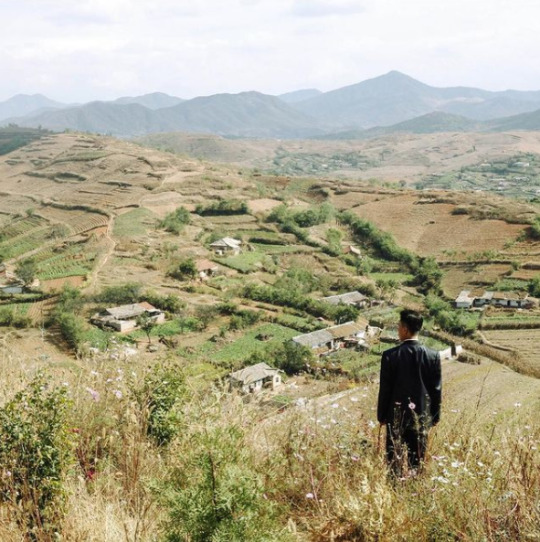
Hey, I'm back again with a very scary "tankie" post that asks you to think of North Koreans as people, and to consider their country not as a cartoonish dystopia, but as a nation that, like any other place on earth, has culture, traditions, and history.
Below is a collection of pictures from various cities and places in North Korea, along with a brief dive into some of the historical events that informs life in the so-called "hermit kingdom."
Warning: very long post
Kaesong, the historic city
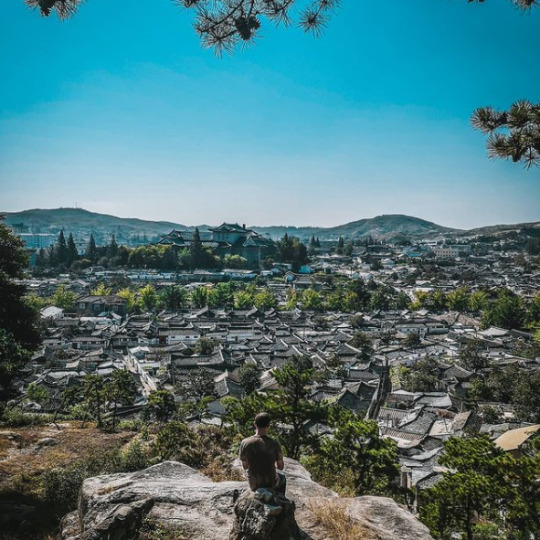
Beginning this post with Kaesong, one of the oldest cities in Korea. It's also one of the few major cities in the DPRK (i.e. "North Korea") that was not completely destroyed during the Korean war.
Every single city you'll see from this point on were victims of intense aerial bombardments from the U.S. and its allies, and had to be either partially or completely rebuilt after the war.
From 1951 to 1953, during what has now become known as the "forgotten war" in the West, the U.S. dropped 635,000 tons of bombs over Korea — most of it in the North, and on civilian population centers. An additional 32,000 tons of napalm was also deployed, engulfing whole cities in fire and inflicting people with horrific burns:
For such a simple thing to make, napalm had horrific human consequences. A bit of liquid fire, a sort of jellied gasoline, napalm clung to human skin on contact and melted off the flesh. Witnesses to napalm's impact described eyelids so burned they could not be shut and flesh that looked like "swollen, raw meat." - PBS
Ever wondered why North Koreans seem to hate the U.S so much? Well...
Keep in mind that only a few years prior to this, the U.S. had, as the first and only country in the world, used the atomic bomb as a weapon of war. Consider, too, the proximity between Japan and Korea — both geographically and as an "Other" in the Western imagination.
As the war dragged on, and it became clear the U.S. and its allies would not "win" in any conventional sense, the fear that the U.S. would resort to nuclear weapons again loomed large, adding another frightening dimension to the war that can probably go a long way in explaining the DPRK's later obsession with acquiring their own nuclear bomb.
But even without the use of nuclear weapons, the indiscriminate attack on civilians, particularly from U.S. saturation bombings, was still horrific:
"The number of Korean dead, injured or missing by war’s end approached three million, ten percent of the overall population. The majority of those killed were in the North, which had half of the population of the South; although the DPRK does not have official figures, possibly twelve to fifteen percent of the population was killed in the war, a figure close to or surpassing the proportion of Soviet citizens killed in World War II" - Charles K. Armstrong
On top of the loss of life, there's also the material damage. By the end of the war, the U.S. Air Force had, by its own estimations, destroyed somewhere around 85% of all buildings in the DPRK, leaving most cities in complete ruin. There are even stories of U.S. bombers dropping their loads into the ocean because they couldn't find any visible targets to bomb.
What you'll see below of Kaesong, then, provides both a rare glimpse of what life in North Korea looked like before the war, and a reminder of what was destroyed.
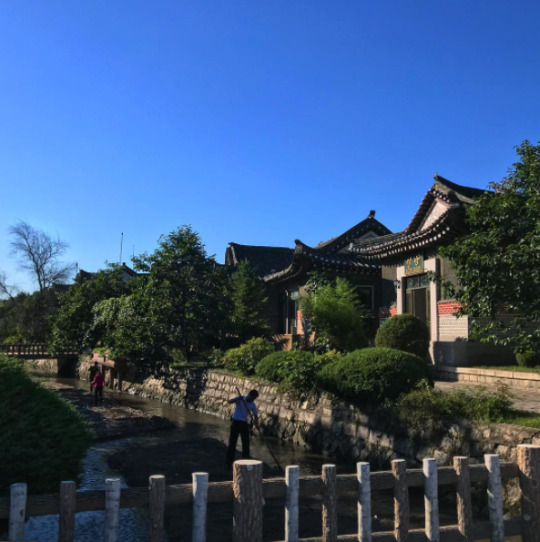
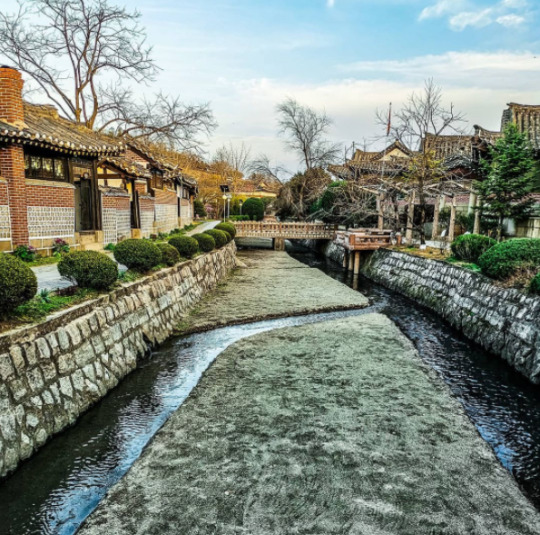
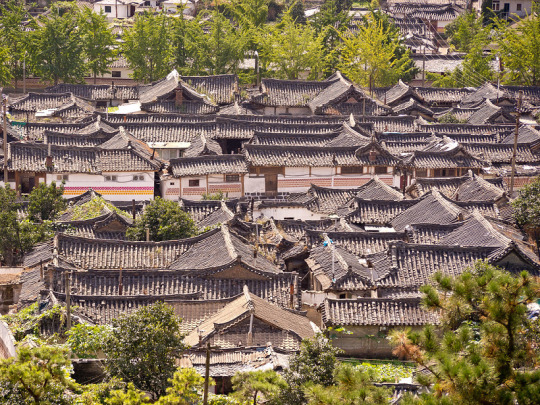
Kaesong's main street, pictured below.
Due the stifling sanctions imposed on the DPRK—which has, in various forms and intensities, been in effect since the 1950s—car ownership is still low throughout the country, with most people getting around either by walking or biking, or by bus or train for longer distances.
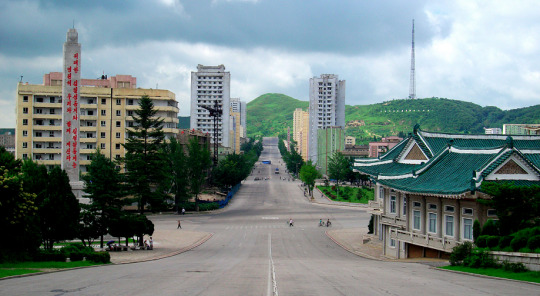
Kaesong, which is regarded as an educational center, is also notable for its many Koryŏ-era monuments. A group of twelve such sites were granted UNESCO world heritage status in 2013.
Included is the Hyonjongnung Royal Tomb, a 14th-century mausoleum located just outside the city of Kaesong.
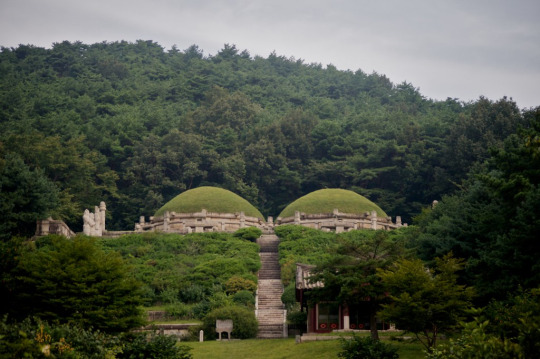
One of the statues guarding the tomb.
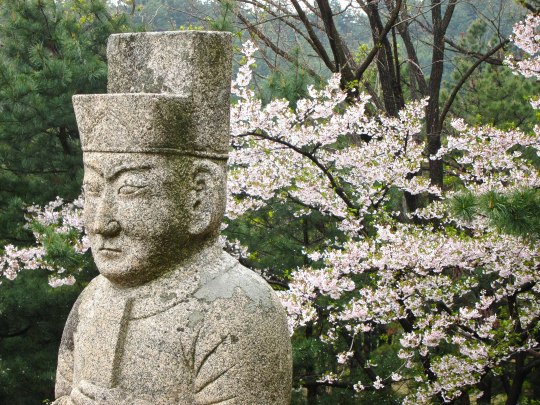
Before moving on the other cities, I also wanted to showcase one more of the DPRK's historical sites: Pohyonsa, a thousand-year-old Buddhist temple complex located in the Myohyang Mountains.
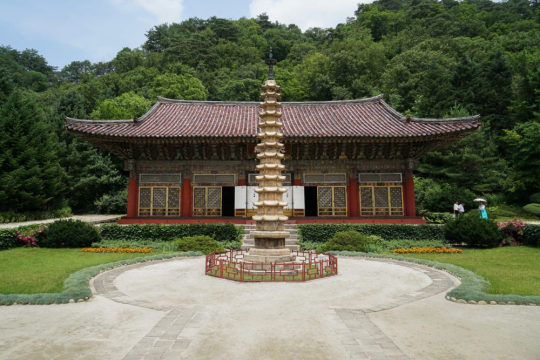
Like many of DPRK's historic sites, the temple complex suffered extensive damage during the Korean war, with the U.S. led bombings destroying over half of its 24 pre-war buildings.
The complex has since been restored and is in use today both as a residence for Buddhist monks, and as a historic site open to visitors.
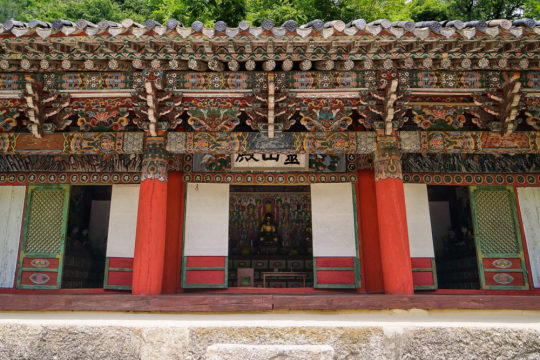
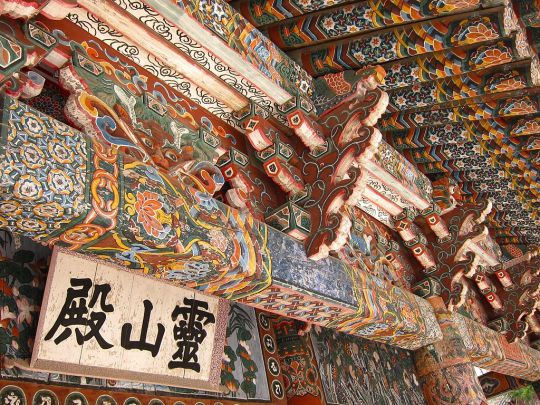
Hamhung, the second largest city in the DPRK.
A coastal city located in the South Hamgyŏng Province. It has long served as a major industrial hub in the DPRK, and has one of the largest and busiest ports in the country.
Hamhung, like most of the coastal cities in the DPRK, was hit particularly hard during the war. Through relentless aerial bombardments, the US and its allies destroyed somewhere around 80-90% percent of all buildings, roads, and other infrastructure in the city.
Now, more than seventy years later, unexploded bombs, mortars and pieces of live ammunition are still being unearthed by the thousands in the area. As recently as 2016, one of North Korea's bomb squads—there's one in every province, faced with the same cleanup task—retrieved 370 unexploded mortar rounds... from an elementary school playground.
Experts in the DPRK estimate it will probably take over a hundred years to clean up all the unexploded ordnance—and that's just in and around Hamhung.
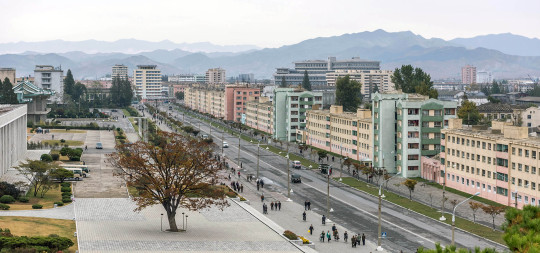
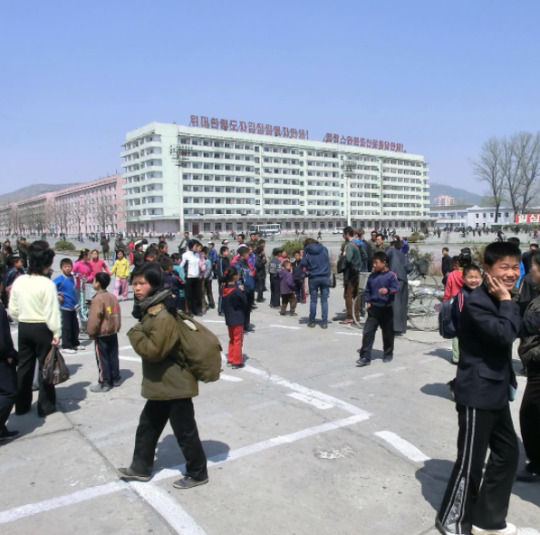
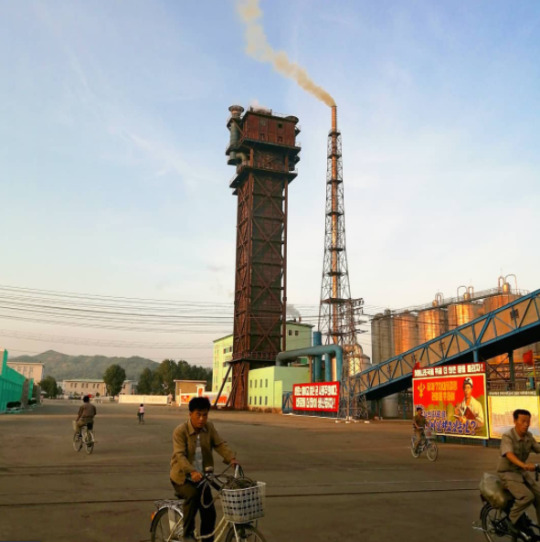
Hamhung's fertilizer plant, the biggest in North Korea.
When the war broke out, Hamhung was home to the largest nitrogen fertilizer plant in Asia. Since its product could be used in the creation of explosives, the existence of the plant is considered to have made Hamhung a target for U.S. aggression (though it's worth repeating that the U.S. carried out saturation bombings of most population centers in the country, irrespective of any so-called 'military value').
The plant was immediately rebuilt after the war, and—beyond its practical use—serves now as a monument of resistance to U.S. imperialism, and as a functional and symbolic site of self-reliance.
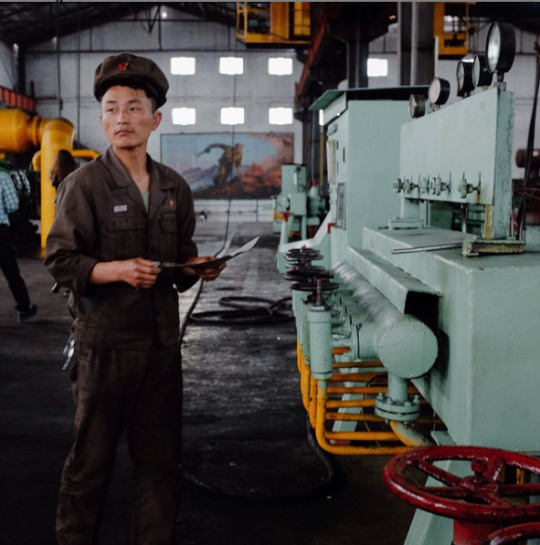
Chongjin, the third largest city in the DPRK.
Another coastal city and industrial hub. It underwent a massive development prior to the Korean war, housing around 300,000 people by the time the war broke out.
By 1953, the U.S. had destroyed most of Chongjin's industry, bombed its harbors, and killed one third of the population.
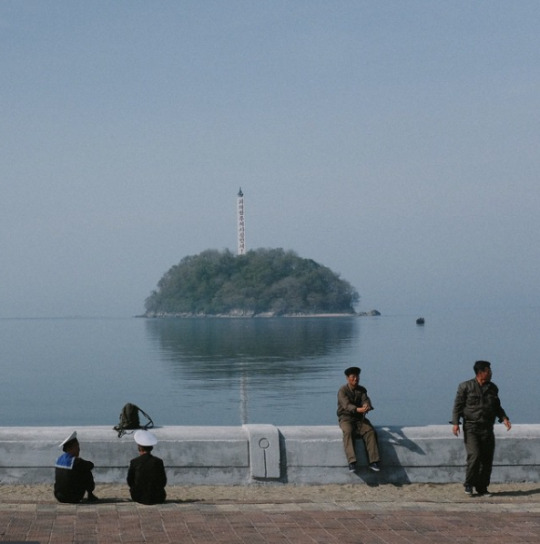
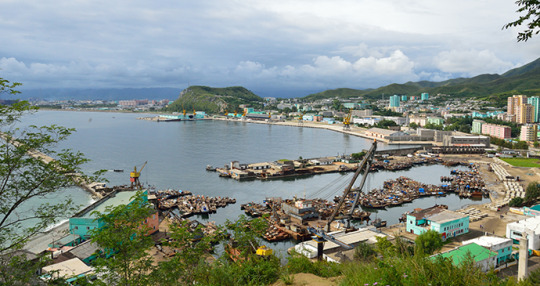
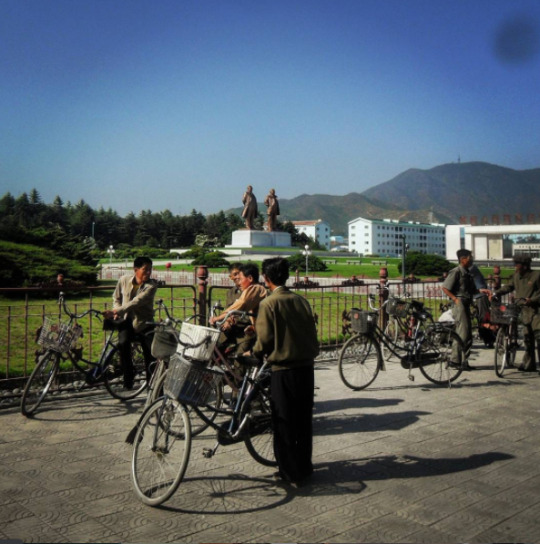
Wonsan, a rebuilt seaside city.
The city of Wonsan is a vital link between the DPRK's east and west coasts, and acts today as both a popular holiday destination for North Koreans, and as a central location for the country's growing tourism industry.
Considered a strategically important location during the war, Wonsan is notable for having endured one of the longest naval blockades in modern history, lasting a total of 861 days.
By the end of the war, the U.S. estimated that they had destroyed around 80% of the city.
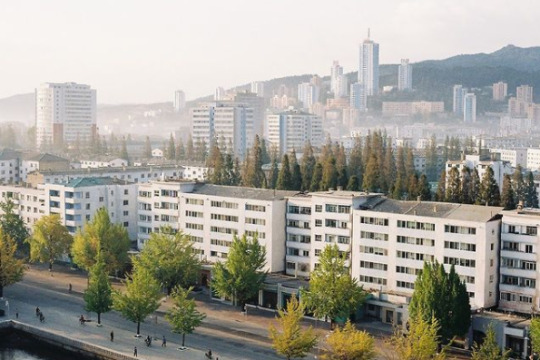
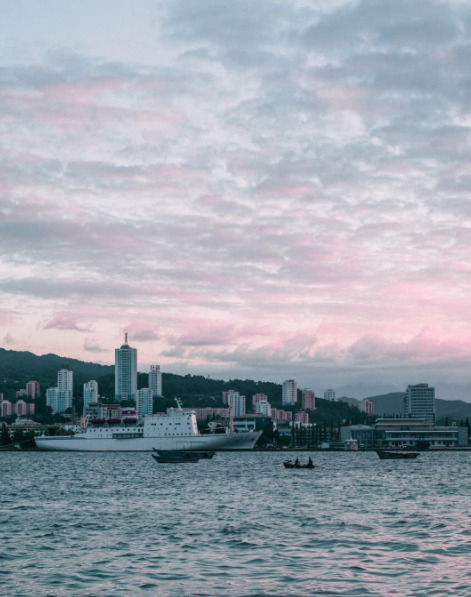
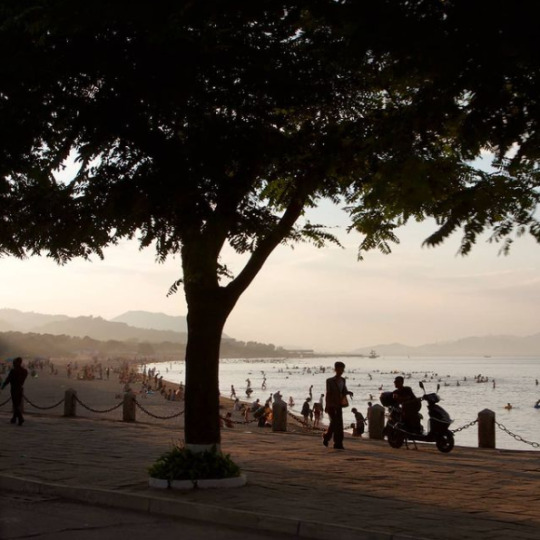
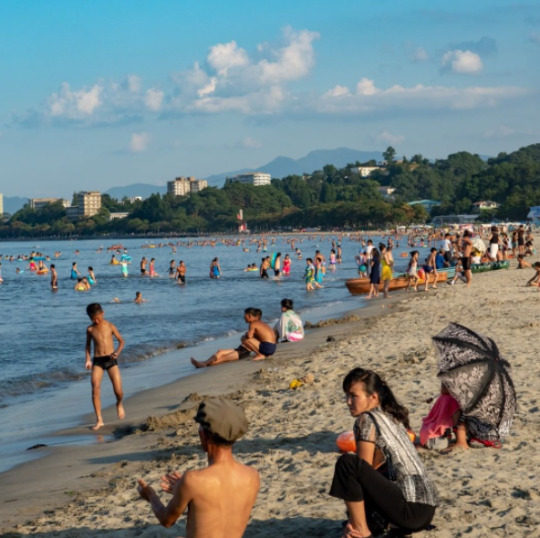
Masikryong Ski Resort, located close to Wonsan. It opened to the public in 2014 and is the first, I believe, that was built with foreign tourists in mind.
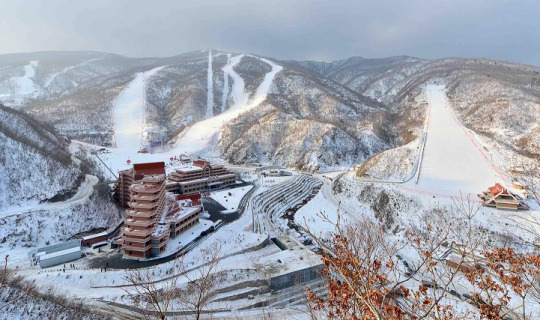
Sariwon, another rebuilt city
One of the worst hit cities during the Korean War, with an estimated destruction level of 95%.
I've written about its Wikipedia page here before, which used to mockingly describe its 'folk customs street'—a project built to preserve old Korean traditions and customs—as an "inaccurate romanticized recreation of an ancient Korean street."
No mention, of course, of the destruction caused by the US-led aerial bombings, or any historical context at all that could possibly even hint at why the preservation of old traditions might be particularly important for the city.
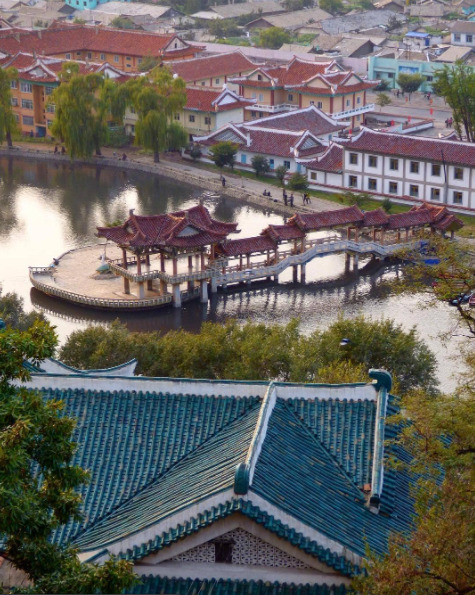
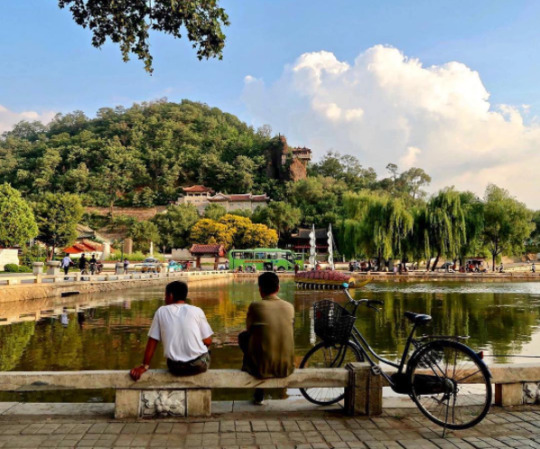
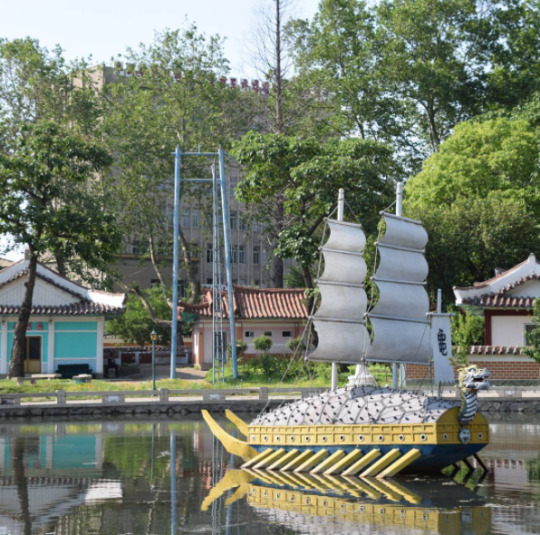
Life outside of the towns and cities
In the rural parts of the DPRK, life primarily revolves around agriculture. As the sanctions they're under make it difficult to acquire fuel, farming in the DPRK relies heavily on manual labour, which again, to avoid food shortages, requires that a large portion of the labour force resides in the countryside.
Unlike what many may think, the reliance on manual labour in farming is a relatively "new" development. Up until the crisis of the 1990s, the DPRK was a highly industrialized nation, with a modernized agricultural system and a high urbanization rate. But, as the access to cheap fuel from the USSR and China disappeared, and the sanctions placed upon them by Western nations heavily restricted their ability to import fuel from other sources, having a fuel-dependent agricultural industry became a recipe for disaster, and required an immediate and brutal restructuring.
For a more detailed breakdown of what lead to the crisis in the 90s, and how it reshaped the DPRKs approach to agriculture, check out this article by Zhun Xu.
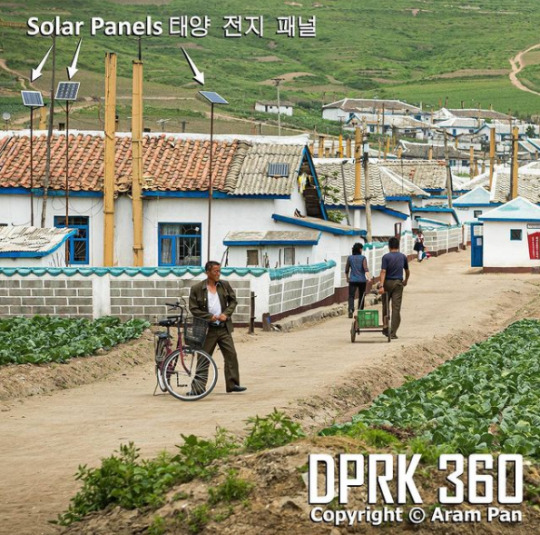
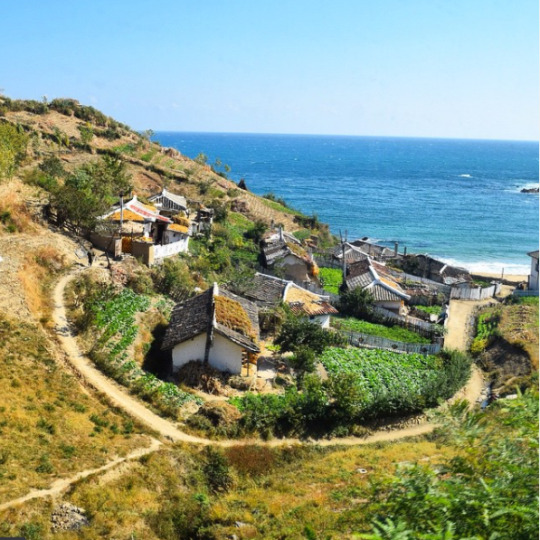
Some typical newly built rural housing, surrounded by farmland.
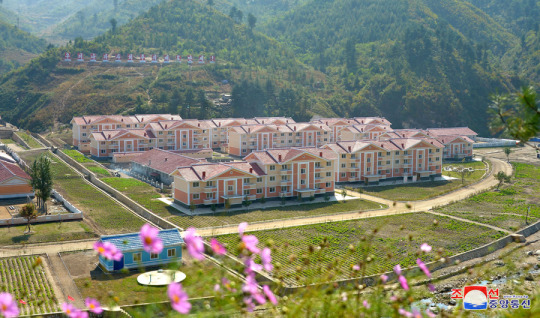
Tumblr only allows 20 pictures per post, but if you want to see more pictures of life outside Pyongyang, check out this imgur album.
#dprk#north korea#i've had this post unfinished in drafts for almost a year#also sorry about the spelling and potential formatting issues it's a nightmare to edit at this point#it was literally just meant to be a collection of picture and then the writing just sort of happened#enjoy the brief heritageposts history lesson i guess
7K notes
·
View notes
Text
Love yourself a little extra right now. You're creating the life of your dreams and you absolutely deserve it. It's about to get magical for you.
#motivation#life#life lessons#self love#writing#heal#positive mental attitude#successmindset#successful#goals and dreams#respect#self confidence#self care#self control#self awareness#heartless#disappointed#sigma#attitude era#positive attitude#life quotes#quoteoftheday#quotes#life quote#beautiful quote#book quote#money#wealth#billionaire#personal development
12K notes
·
View notes
Text
The best compliment is to accept someone with whatever they have.
#life#love#life is strange#quotes#dark academia#life series#literature#readblr#life lessons#love reading#dark romanticism#dark romance#romance#intimacy and sex#spilled poetry#spilled truth#spilled words#spilled thoughts#spilled ink#spilled writing#love and deepspace#philosophical#philosophers#philosopher#philosophy#philosophy of life#black tumblr#wisdom#writers on tumblr#poetry
1K notes
·
View notes
Text
Sometimes, it isn’t the one who takes your breath away, it’s the one that reminds you to breathe.
k.b. // by jennifer johnson
#k.b.#quotes#poets on tumblr#writers on tumblr#love#love quotes#quote#words#love quote#cute#deep thoughts#i love you#life#life quotes#life lesson#life lesson quotes#writers#poetry#poem#writing#tik tok#tik tok quotes#facebook#facebook quotes
30K notes
·
View notes